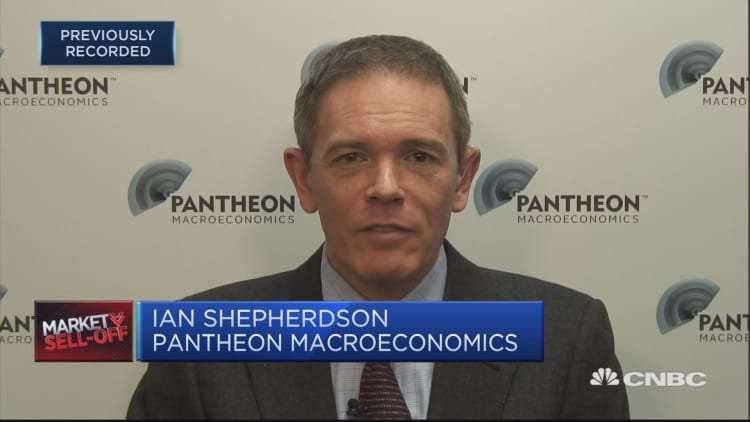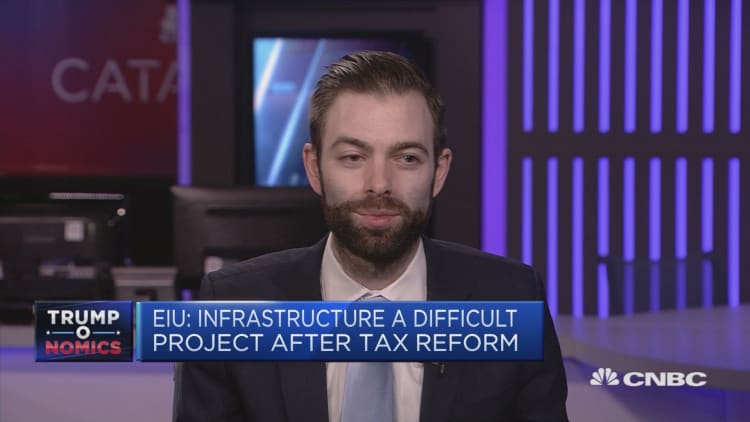
A massive deficit will be President Donald Trump's legacy, financial strategists are warning as the U.S. budget is expected to rise to accommodate the government's spending plan.
"My view is that this fiscal expansion is probably the most foolhardy escapade in modern economic policy history," Albert Edwards, an ultra-bearish global strategist at Societe Generale, said in a client note Wednesday.
While agreeing that he felt U.S. corporate taxes were anomalously high, Edwards criticized the timing of the fiscal stimulus as "utterly ridiculous" and warns it "will only accelerate the collapse of U.S. financial markets as the Federal Reserve hikes rates even more quickly."
With the current growth picture in the U.S. — unemployment at a 17-year low and wages and company earnings steadily strengthening — a double-dose of fiscal stimulus is the last thing that is needed and threatens to seriously overheat the economy, numerous analysts and politicians are saying.
The Trump administration's proposed $1.5 trillion infrastructure plan, $200 billion of which is to be provided by the federal government, comes on top of a recently-passed spending budget of $300 billion over the next two years. That stimulus is in addition to the Republican-led Tax Cuts and Jobs Act passed in December, which is estimated to deliver $1.5 trillion in tax cuts over next decade. And interest payments will add $420 billion to the national debt over that same time frame, pushing the deficit above $2 trillion, according to the Committee for a Responsible Budget. The current budget deficit is $440 billion.
Together, this is slated to expand the deficit by more than 5 percent of the country's gross domestic product (GDP) by the end of this year, according to some estimates. While likely to spur economic growth and activity in the immediate term, the spending and borrowing expansion could also foreshadow a significant uptick in inflation.
The Federal Reserve may therefore have to step on the gas just to counter all this fiscal stimulus and issuance of new debt, and as a result Treasury bond yields and rates could rise, risking a further fall for equities. Markets plummeted at the start of last week and entered correction mode on the back of spiked yields and stronger-than-expected U.S. wage and employment data. Companies experience higher borrowing costs when yields rise and investors grow more cautious of investing in their stock.
Inflation data posted Wednesday came out at 0.5 percent for January, up from a previous 0.4 percent. The yield on the benchmark 10-year Treasury note was higher on Thursday morning at around 2.962 percent.

"U.S. wage and price inflation are rising briskly, putting intense downward pressure on financial markets," Edwards said in the note, adding that "the post-mortem will identify President Trump's ludicrously timed fiscal stimulus as a key trigger for the collapse."
Mike Jakeman, global economist at the Economist Intelligence Unit, stressed that infrastructure would be a difficult project for Trump after tax reform.
"Trump doesn't have the money to spend on infrastructure," he told CNBC this week, noting that the new budget represented a huge shift from the traditionally hawkish deficit stance held by most Republicans. "This is an extraordinary gamble with Americans' future fiscal health."
Meanwhile, supporters of the plan, including House Budget Committee Chairman Steve Womack, are positive about its long-term effects.
"While there are going to be some near-term deficit increases, we think the long-term health of the American economy is going to be much better as a result," the Arkansas Republican told CNBC on Tuesday. "If we can achieve 3 percent growth, then we have achieved a great victory."
Conservative think-tank weighs in
The Heritage Foundation, a notably conservative economic policy think tank in Washington, D.C., described the spending plans as unsound.
"It fails as sound fiscal policy," said Justin Bogie this week, the foundation's senior policy analyst in fiscal affairs, noting that just last year the Trump administration proposed balancing the federal budget within a decade.
"This proposal would add an additional $7 trillion to the national debt — something not even a big spender like President Obama ever proposed," he said on the foundation's website.
Chief economist at Pantheon Macroeconomics, Ian Shepherdson, agreed, albeit in more scathing tones. The bipartisan budget package amounts to 0.7 percent of GDP on top of tax cuts of 0.5 percent of GDP, he observed. This when the economy is growing at near 3 percent is "crazy" and "the economy doesn't need it," he told CNBC.
"This is the dumbest thing the U.S. could possibly do," Shepherdson said of the spending bill. "Politicians are acting exclusively on re-elections and not on the effect of the real economy."
Spirits are high among U.S. consumers, many of whom saw a temporary boost to their wages as a result of the tax bill. But if the prominent economic forecasts are anything to go by, the current economic stimulus being enjoyed by both consumers and companies across America may come at a hefty price.



